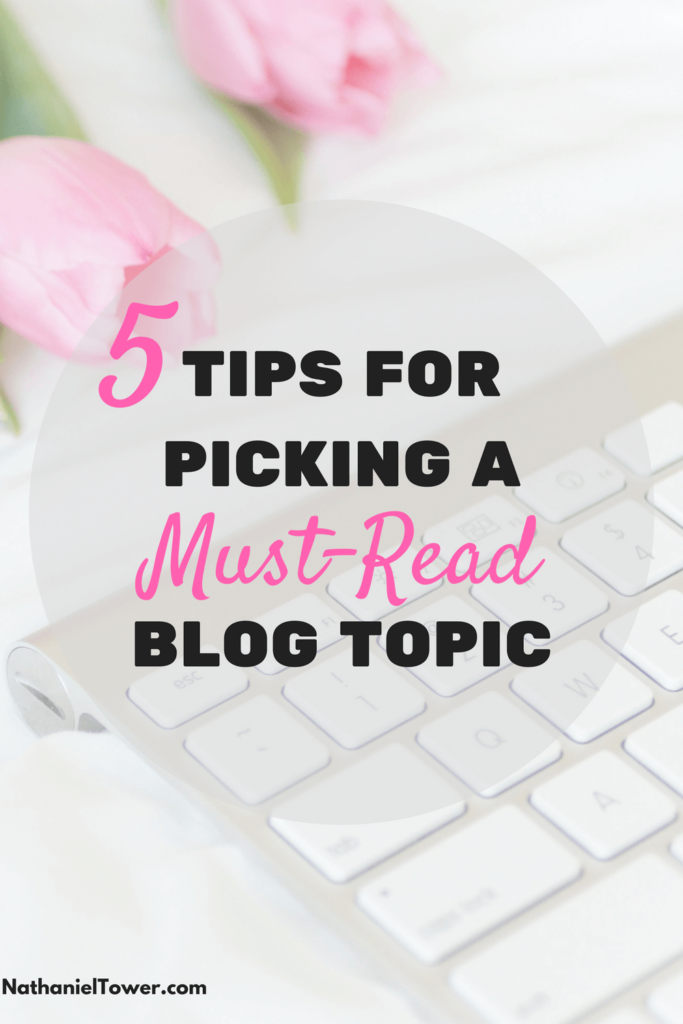Last Updated on March 22, 2020 by Nathaniel Tower

Whether you just started a blog or have been at it for years, a question that probably haunts you on a regular basis is, “What should I blog about?”
It’s not always an easy question. While you sometimes have tons of ideas on your mind, other times you struggle to find something to say—especially something you think people will actually want to read about.
First, some discouraging (and encouraging) data
What makes the struggle even tougher is the sheer volume of content that’s out there. There are as many as 440 million blogs on the web today. With that many blogs, the odds might seem against you no matter what topic you pick to write about. Of course, many of those blogs are inactive, and many of them produce spammy or junk content, so you don’t have to worry about competing against all 440 million of them. You can probably narrow it down to 100 million or so blogs that are actually worth reading.
According to WordPress, there are about 86.4 million blog posts published per month on their platform. That’s a lot of content. Here’s some good news for you: WordPress estimates 21 billion blog pageviews each month, spread out over 74.6 million sites. If each WordPress site received equal readership, that would be about 281 pageviews per blog each month. Unfortunately, that number of pageviews isn’t going to pay any bills.
Obviously readership isn’t spread out evenly. Readership heavily favors high-authority websites and well-known bloggers. And what’s one thing they generally have in common? They produce content that people actually want to read. You can do that too. You just need to know what to blog about.
Enough with facts and data. Let’s talk about how to pick a topic people will actually want to read.
Tip 1: Write about something that answers a commonly asked question
What do people really want to know in your niche? Answering a commonly asked question is a great way to bring readers to your blog. There are a lot of ways to find good questions to write about:
- Think about your own questions. If you’re looking for an answer, there are probably a lot of other people with the same question.
- Look at groups related to your niche and see what questions people ask frequently. Facebook, Twitter, reddit, and many other platforms can be great sources for these questions.
- Use a tool like Moz Keyword Explorer to find questions people are searching for. Start with a general topic, like “blogging.” Then break down the keyword suggestions by “are questions.” You’ll instantly get tons of ideas for questions you can write about. Here is a quick example:

Obviously you’ll need to pick something you’re comfortable tackling. You can see from the above that “how to start a blog” gets a lot of monthly volume. It’s also highly competitive and will be quite difficult to add anything to the discussion that hasn’t already be said. Be sure you plan accordingly when you pick your question to answer.
No matter what question you choose to answer, make sure you give it thorough attention. The more developed your answer is—and the more sources you use—the more attractive it will be to readers who are asking these questions. The best approach? Answer the question so thoroughly that your reader will feel like your post is the authority on the topic. They shouldn’t need to go anywhere else to find an answer.
Tip 2: Write about something that will help people
Everyone needs help. That’s one of the most common reasons people use the internet. Pick a topic that provides a solution to a common problem. This could be in the form of tips, step-by-step directions (with images or video, if possible), specific examples, etc. Here are some examples that I’ve seen a lot of success with on my own blog:
- How to improve your acceptance rate
- How to track your submissions effectively
- How to interpret a rejection
Helpful content can appear in a lot of different forms. Think of what you’re good at or what you’ve done and share that information with other people. It doesn’t have to be rocket science, but if you’re good at that, you might as well share that too.
Tip 3: Write about something that’s controversial or polarizing
I’m not advocating for stirring up controversy just for the sake of stirring up controversy. I certainly don’t want you to get political or religious, especially if those aren’t topics you normally cover on your blog. No matter what you write about, you should always stay within the general theme of your blog. What I’m suggesting here is that you explore a topic that generally divides people in your niche.
Take my recent post about whether or not you should write every day, which has quickly become one of my most popular posts of all time. Why? Because this is an issue a lot of people struggle with. The idea that you must write every day is common advice, but many people don’t believe in it or can’t do it. By thoroughly exploring both sides of the issue, this post engaged all readers regardless of their stance on the issue. Notice that I’m not forcing you to take a side on the controversial topic. Nor am I saying you need to take a wishy-washy approach. The best approach to polarizing topics is finding a balance that will engage all readers rather than alienating half of them.
Tip 4: Write about something you’ve never seen written about before
Okay, this one is a bit risky. If no one else has ever written about it before, then it’s quite possible there’s no demand for it. However, it can lead to huge rewards if it’s an engaging topic that simply hasn’t been covered before. Not everything has been written before. Alternatively, you can take a new approach on a familiar topic. Just make sure that you’re doing something different. The overall approach here is pretty simple. Brainstorm ideas for things you’d like to read about that don’t seem to be covered anywhere. Then start writing about one of those topics.
Tip 5: Write about something that means a lot to you
If it means a lot to you, chances are that it will mean something to someone else, especially if you craft it in a way that’s meaningful. Wow, there was a lot of “meaning” in that sentence! Write about a topic you’ve been thinking about for a long time and that you are passionate about. Go tell your story and make it meaningful. Again, you don’t have to rack your brain for hours to come up with topics. Make a list of things that you’re passionate about and then start writing.
Still not feeling motivated after reading these five tips? Try writing something completely outlandish.
Picking the right topic is only half the battle
No matter what you write about, you need to bring readers to your blog. “Build it and they will come” only gets you so far when it comes to blogging. Heck, there’s a good chance the best blog post ever written has only been read by a few people because it wasn’t promoted very well. So how do you promote your brilliant post? Well, that’s another topic for another day. Besides, you need to write that great piece of content before you can go and promote anything.
How do you figure out what to blog about? Share your tips in the comments.



Yeesh, that’s a lot of work. I’ve taken to just smashing my forehead against the keyboard and throwing some stock images in there for good measure. My daily views went from 3 to 4. A 25% increase!
Ah Nat, this is too helpful. I’m bookmarking this post ASAP. Thank you
This is a pretty helpful post. I didn’t know about the keyword explorer. That sounds neat and it might just help me a lot, as I am pretty new and had almost zero knowledge about it all. All the links you provided are pretty good too!! So, thank you for sharing that.
Lots of info here-bit daunting to us starting out but Rome wasn’t built in a day and all that 🙂
Thanks again for this helpful post.
This is very reassuring. Thanks!
Hey, I nominated for the Mystery Blogger Award here :
https://bookwormmuse.wordpress.com/2018/01/20/the-mystery-blogger-award/
Thank you for the nomination! I’ll do my best to get to your questions soon.
Very useful advice, thanks!
Very helpful post. Come 2018 and I seem to have run out of ideas so this definitely helps. Thanks.
Thank you for this. It’s great.